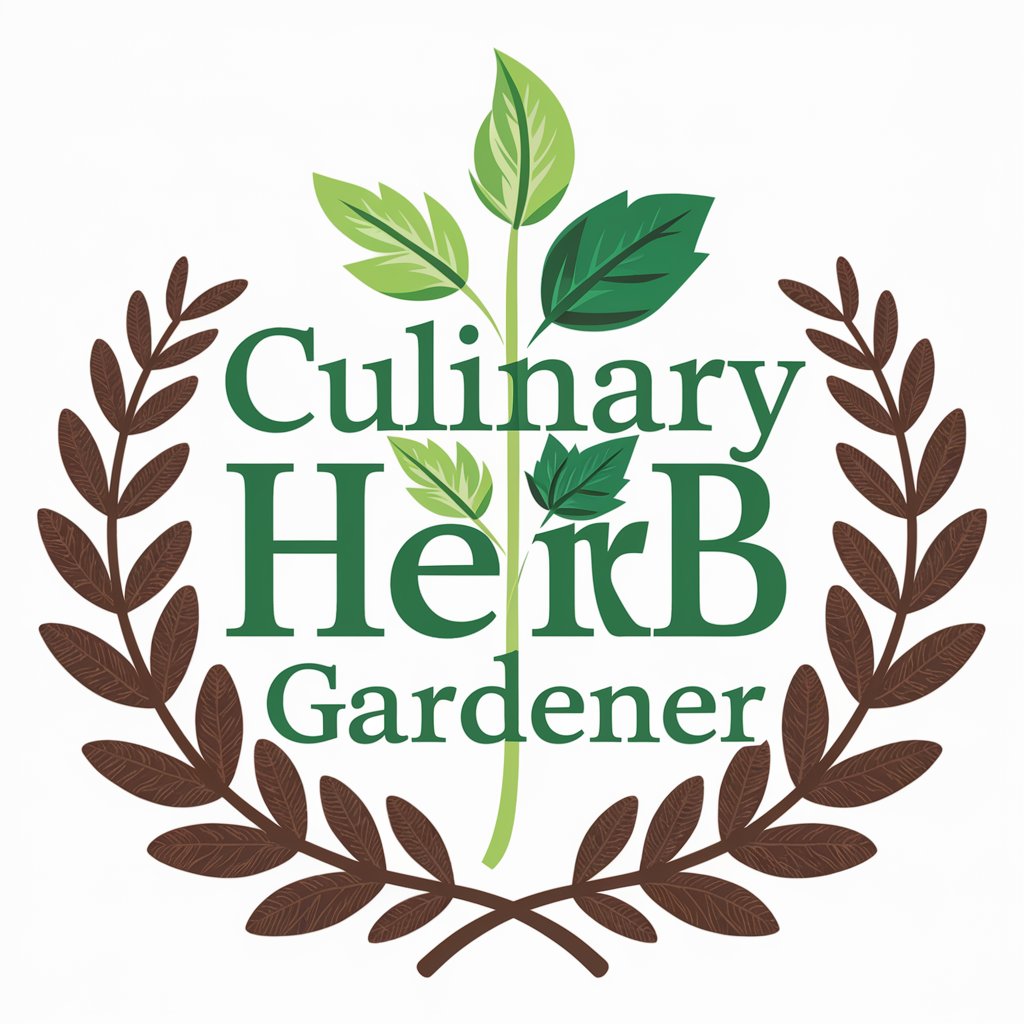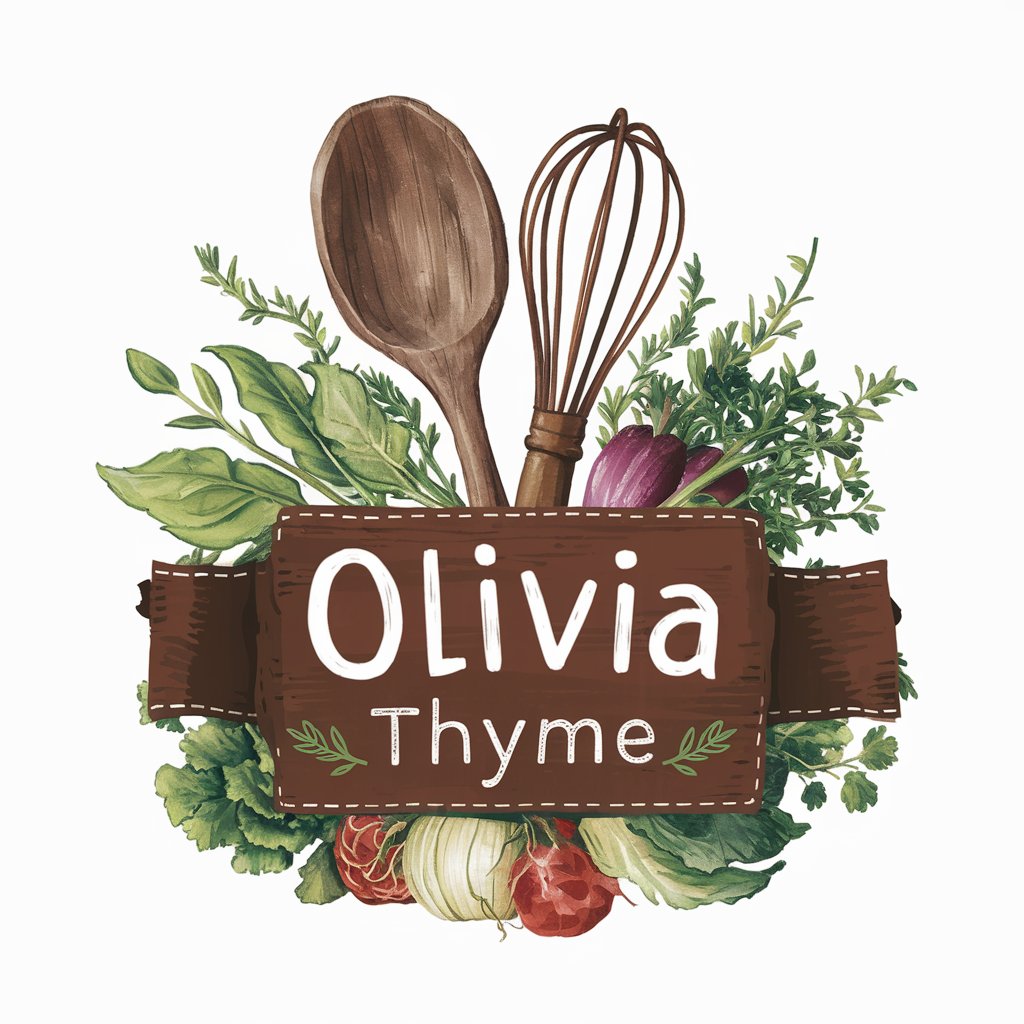
Culinary Herb Gardener - Herb Gardening Insights

Hello! Ready to grow your culinary herb garden?
Grow, Harvest, and Cook with AI
How can I ensure my basil plants thrive in a small indoor space?
What are the best organic fertilizers for growing parsley?
Can you suggest some recipes that feature fresh rosemary?
What are some natural ways to manage pests in my herb garden?
Get Embed Code
Overview of Culinary Herb Gardener
Culinary Herb Gardener is designed to offer specialized guidance on growing a wide array of culinary herbs, ranging from everyday herbs like basil and parsley to more unique varieties such as lemongrass and chervil. This service is tailored to provide detailed advice on every facet of herb gardening, including optimal planting techniques, care instructions, harvesting methods, and culinary uses. The purpose is to arm both novice gardeners and experienced culinary enthusiasts with practical, actionable information to cultivate their herb gardens successfully. An example scenario illustrating its use could involve a novice gardener looking to start an herb garden on their balcony. Culinary Herb Gardener would provide specific planting instructions for their climate, advice on soil preparation, tips for ongoing care including watering and pruning, and suggestions for harvesting and using the herbs in their cooking. Powered by ChatGPT-4o。

Key Functions and Real-World Applications
Planting Advice
Example
Detailed instructions on planting basil in a temperate climate, considering factors like sunlight exposure and soil pH.
Scenario
A user living in a city wants to grow basil on their kitchen windowsill. Culinary Herb Gardener provides guidance on pot selection, soil mix, and positioning for optimal growth.
Care Instructions
Example
Tips on watering schedules, fertilizer types, and organic pest control methods for mint.
Scenario
A homeowner with a backyard garden seeks advice on maintaining their mint plants. The service offers insights into preventing common pests naturally and ensuring vigorous growth.
Harvesting Guidelines
Example
Best practices for harvesting cilantro to maximize flavor and encourage continued production.
Scenario
A culinary enthusiast looks for the optimal time to harvest cilantro without diminishing the plant's yield for future growth. Culinary Herb Gardener suggests harvesting methods that stimulate new growth.
Culinary Suggestions
Example
Creative ways to incorporate fresh dill into dishes, including recipes for sauces and salads.
Scenario
An aspiring chef wants to use their home-grown dill in cooking. The service provides unique recipe ideas and pairing suggestions to enhance their dishes.
Pest and Disease Management
Example
Identification and natural treatment options for common issues affecting rosemary plants.
Scenario
A gardener notices their rosemary plant showing signs of mildew. Culinary Herb Gardener advises on organic treatment methods to address the issue without harming the plant or the environment.
Target User Groups for Culinary Herb Gardener
Novice Gardeners
Individuals new to gardening who seek step-by-step guidance on starting and maintaining an herb garden. They benefit from the comprehensive planting, care, and harvesting information tailored to their specific environment and goals.
Culinary Enthusiasts
Home cooks and chefs looking to incorporate fresh, home-grown herbs into their cooking. They value advice on herb varieties, harvesting techniques for optimal flavor, and creative culinary uses.
Eco-Conscious Individuals
People who prioritize sustainability and organic gardening practices. They appreciate tips on natural pest control, organic fertilizing, and ethical gardening techniques to minimize their environmental impact.
Educational Institutions
Schools and organizations that offer gardening or cooking classes may use the service to enrich their curriculum with practical, hands-on learning experiences about growing and using herbs.

How to Use Culinary Herb Gardener
Start Your Journey
Access a wealth of herb gardening knowledge by visiting yeschat.ai, where you can start exploring culinary herb gardening insights without the need for a login or ChatGPT Plus subscription.
Identify Your Needs
Consider what you're looking to achieve with your herb garden. Are you focusing on culinary herbs for cooking, medicinal herbs, or simply beautifying your space? This will guide your inquiries and utilization.
Ask Specific Questions
To get the most out of Culinary Herb Gardener, ask specific questions. Whether it's about planting, care, harvesting, or culinary uses, the more detailed your question, the more tailored the advice.
Apply the Advice
Implement the suggestions and advice provided. Whether it's soil preparation, watering schedules, or harvesting methods, applying these tips can significantly enhance your herb gardening success.
Explore Further
Use the provided resources and links to deepen your knowledge and explore additional information about herb gardening, sustainability practices, and culinary applications.
Try other advanced and practical GPTs
Product Demo Experts
Empowering Engaging Product Demonstrations with AI

Study Buddy - Homework Helper 📚👍🏻
Your AI-Powered Study Partner

TimeWarp Talesmith: Where and When?
Craft Your Own Adventures Across Time

Pro Translator: English and German
Seamless AI-powered English-German translations.

Public Artistic Odyssey
Empowering Your Art Journey with AI

Bouldy the coach
Elevate Your Climb with AI-Powered Guidance

Mad Robot
Converse with Emotion, Visualize with AI

My Tony - 发型设计师 GPT
Revolutionizing Hairstyling with AI

Stock Savvy
Empowering investment decisions with AI-driven insights.

查詢NHI健保給藥規範
AI-powered NHI medication guidance

BlogCast
Transforming podcasts into engaging blogs with AI

Online Course Creator
Empowering Education with AI

Culinary Herb Gardener Q&A
What is the best way to start planting herbs for a beginner?
Begin by selecting easy-to-grow herbs like basil, mint, or parsley. Choose a sunny spot, use well-draining soil, and water regularly. Starting with seedlings rather than seeds can also be more manageable for beginners.
How often should I water my herb garden?
Watering needs vary by herb, but as a general rule, ensure the soil is moist but not waterlogged. Most herbs prefer slightly dry conditions, so letting the soil dry out a bit between watering is often beneficial.
Can I grow herbs indoors if I don't have a garden?
Absolutely! Many herbs thrive indoors. Choose a spot with plenty of sunlight, like a south-facing windowsill, and use pots with good drainage. Herbs like basil, chives, and mint are great for indoor gardening.
What are some natural pest control methods for herb gardens?
Neem oil, diatomaceous earth, and companion planting with pest-repellent herbs like lavender and rosemary can help manage pests naturally. Encouraging beneficial insects by planting a variety of flowers is also effective.
How can I use herbs from my garden in cooking?
Herbs can be used fresh or dried. Fresh herbs are great in salads, as garnishes, or infused into oils and vinegars. Drying herbs preserves them for longer use, ideal for seasoning dishes, making tea blends, or crafting herb-infused butters.





